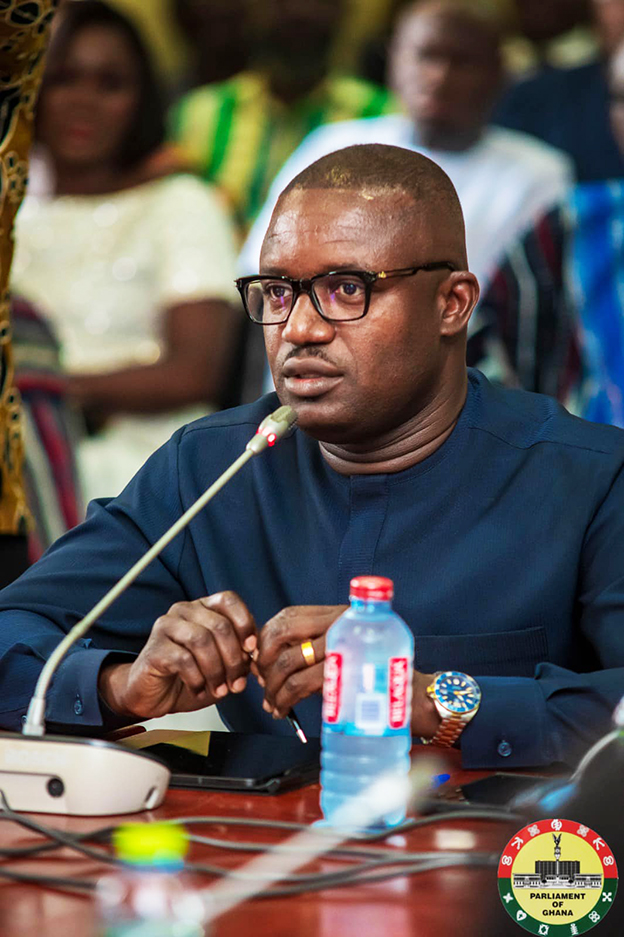Energy Minister-Designate, John Abdulai Jinapor, has vowed to ensure discipline, honesty and integrity as he steps into what he describes as a “very difficult job.”
Speaking at his vetting before Parliament’s Appointments Committee on January 13, 2025 Mr. Jinapor outlined his vision to address Ghana’s mounting energy sector challenges, with a focus on sustainable reforms and pragmatic solutions.
“I want to be remembered as the young minister who insisted on discipline. I will step on toes, but I will step on them gently,” he declared.
Energy Sector Debt Crisis
Mr. John Jinapor faces an uphill task, inheriting a sector burdened by a staggering $3 billion debt as of January 12, 2025.
He revealed that the financial strain is compounded by unpaid obligations to Independent Power Producers (IPPs), which reached $1.2 billion in October 2024.
Comparing the current situation to his tenure under the first Mahama administration, he noted, “When we left office on August 31, 2017 the debt was $2.1 billion. Today, it has escalated beyond $3 billion.”
To address the debt, Mr. Jinapor stressed the importance of identifying unaccounted-for power sales and implementing robust accountability measures.
He proposed a disciplined approach to financial management within the sector, emphasising transparency and stakeholder collaboration.
“This situation requires urgent and pragmatic solutions to ensure the sustainability of the sector and the economy,” he stated.
Private Sector Participation in ECG Operations
The Minister-Designate proposed an innovative plan to enhance efficiency within the Electricity Company of Ghana (ECG) through private sector involvement.
He announced the formation of a seven-member committee, comprising technical, legal and financial experts, industry players and consumer representatives to develop a framework for private sector participation.
“We believe there should be private sector participation. What we intend to do is to form a seven-member committee chaired by technical experts, legal experts, financial experts, some industry players and even somebody from the consumer side,” Mr. Jinapor stated.
He outlined the committee’s mandate to design a comprehensive framework based on global best practices, evaluating whether a concession model or full privatisation would be most suitable. He also assured that the process would be devoid of political interference.
“We will stay off as politicians and let them develop a framework in a transparent, open and frank manner. Once we get the buy-in of Ghanaians, we can set standards using a Request for Proposal (RFP) or competitive tender process,” he added.
The Minister-designate made it clear that the government would not resort to sole-sourcing for private sector participation in ECG operations. Instead, a competitive process with a strong emphasis on local content and Key Performance Indicators (KPIs) would be adopted.
“Our approach ensures a clear path forward, incorporating private sector expertise while safeguarding national interests,” he explained.
Revitalising TOR and Refining Operations
On the Tema Oil Refinery (TOR), Mr Jinapor acknowledged its challenges, including outdated infrastructure and a bloated workforce. He revealed plans to seek strategic partnerships to inject capital and rehabilitate the refinery, which has been non-operational since 2021.
“Our objective is to restructure liabilities and leverage TOR’s assets to attract investors. With the right interventions, TOR can return to full operation and contribute significantly to our economy,” he explained.
Reviving the Upstream Sector
Addressing the declining crude oil production in the upstream sector, Mr. Jinapor highlighted the urgent need for investments.
He revealed that crude oil volumes have dropped by 32% since 2019, with projections indicating further decline.
He proposed revising Ghana’s fiscal regime to offer tailored incentives for deep-water and shallow-water projects, expanding acreage allocations, and addressing legal disputes that deter investors.
Meter Replacement
The Minister-Designate also announced plans for a major overhaul of the Electricity Company of Ghana’s (ECG) metering system, with approximately 2.9 million meters requiring urgent replacement to improve revenue collection.
Responding to a question from Lawrence Agyinsam, MP for Hemang Lower Denkyira Constituency about improving ECG revenue collection and the possibility of phasing out post-paid meters, Mr Jinapor revealed, concerning statistics about the current state of ECG’s metering system.
“Of ECG’s 5.2 million total meters, 4.8 million are active, but about 3 million of these are not functioning properly,” Mr Jinapor stated during his vetting on Monday.
He said this malfunction represents a significant obstacle to effective revenue collection for the utility company.
To address these challenges, the Minister-Designate outlined plans to modernize the system through smart metering technology.
The proposed solution includes making meters available for direct purchase by consumers, with installation to be handled by licensed technicians.
The new system will incorporate mobile money integration, allowing customers to activate their meters through a code-based system.
“Because sometimes it costs people more than four or five times to spend money to get the meter. So if we make it readily available and use economies of scale, I’m sure the price will come down,” Mr. Jinapor explained.










